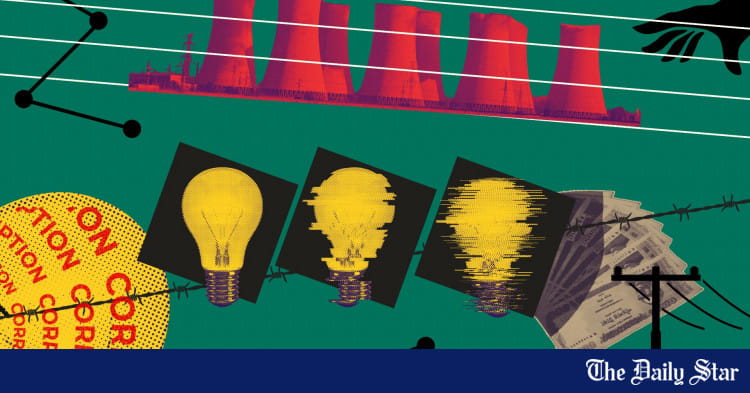Saif
Senior Member
- Joined
- Jan 24, 2024
- Messages
- 17,346
- Likes
- 8,373
- Nation

- Residence

- Axis Group


Ensuring urgent fuel supply to power plants
Severe load-shedding in the northern and northeastern districts including also Dhaka over the past few days has been causing enormous public suffering. The problems causing the disruptions in smooth power supply are, however, inherited from the immediate past government. The shutting down of
Ensuring urgent fuel supply to power plants
Published :
Sep 13, 2024 21:56
Updated :
Sep 13, 2024 21:56

Severe load-shedding in the northern and northeastern districts including also Dhaka over the past few days has been causing enormous public suffering. The problems causing the disruptions in smooth power supply are, however, inherited from the immediate past government. The shutting down of all the operational units of Dinajpur's 525-MW coal-fired power plant, most of the country's gas-fired power plants which share more than 40 per cent of country's total generation capacity remaining out of production due to gas shortage and the huge arrears of unpaid power bills owed to a major power supplier from India, the Adani Group, are some of the issues debilitating the interim government's capacity to resolve the power shortage issue within a short time.
According to the Power Development Board (PDB), its total unpaid bills amount to Tk 350 billion. Even so, the adviser to the ministry of power, energy and mineral resources is learnt to have informed the media on September 11 last that the power situation would improve within three weeks. The steps to be taken for urgent addressing of the issues, he further informed, include urgent fixing of the technical glitches at the Barapukuria thermal power plant, the communication made with the Adani Group to enhance power supply and arrangements made to import LNG (Liquefied Natural Gas). The interim government's sincerity and urgency to respond to the emerging issues will make a difference. Any short-term answer to the problems involving production, supply and distribution of power should be part of a long-term strategy to rid the sector of its deeply ingrained ills. The long-term approach, as often stressed by well-meaning people and experts, should be to exploit the country's own potential reserves of gas and other fossil fuels.
The present problem of the power sector arises out of a lack of fuels to run power plants and the shortage of foreign currency to import those. But these problems could be avoided if the country's power sector was not fully made dependent on fuel import that eats up the lion's share of the hard currency that the country earns from remittances and exports. The main beneficiaries of this policy adopted by the past government have been the private power companies, contractors enjoying the government's patronage, the corrupt bureaucrats and ministers. Sadly, the nation's forex reserve was thus depleted to import LNG, coal and oils to feed the power plants that have the capacity to produce about double the power the country needs at the moment. But those remain idle for a lack of fuel. Now the nation is being forced to bear this unnecessary burden.
Under the circumstances, it would be incumbent upon the interim government to meet the emergencies through holding negotiations with major sources of fuels including the gulf countries, Indonesia and elsewhere so that fuel supplies to the power plants remain uninterrupted. At this point, the steps taken, as told by the energy adviser, to scrap the indemnity act "Quick Enhancement of Electricity and Energy Supply (Special Provision) Act in 2010" to protect the government from any judicial proceedings drawn against it, cancellation of the ministry's authority to fix energy tariffs, holding open bids for contractors and so on should be implemented as soon as possible.
Published :
Sep 13, 2024 21:56
Updated :
Sep 13, 2024 21:56
Severe load-shedding in the northern and northeastern districts including also Dhaka over the past few days has been causing enormous public suffering. The problems causing the disruptions in smooth power supply are, however, inherited from the immediate past government. The shutting down of all the operational units of Dinajpur's 525-MW coal-fired power plant, most of the country's gas-fired power plants which share more than 40 per cent of country's total generation capacity remaining out of production due to gas shortage and the huge arrears of unpaid power bills owed to a major power supplier from India, the Adani Group, are some of the issues debilitating the interim government's capacity to resolve the power shortage issue within a short time.
According to the Power Development Board (PDB), its total unpaid bills amount to Tk 350 billion. Even so, the adviser to the ministry of power, energy and mineral resources is learnt to have informed the media on September 11 last that the power situation would improve within three weeks. The steps to be taken for urgent addressing of the issues, he further informed, include urgent fixing of the technical glitches at the Barapukuria thermal power plant, the communication made with the Adani Group to enhance power supply and arrangements made to import LNG (Liquefied Natural Gas). The interim government's sincerity and urgency to respond to the emerging issues will make a difference. Any short-term answer to the problems involving production, supply and distribution of power should be part of a long-term strategy to rid the sector of its deeply ingrained ills. The long-term approach, as often stressed by well-meaning people and experts, should be to exploit the country's own potential reserves of gas and other fossil fuels.
The present problem of the power sector arises out of a lack of fuels to run power plants and the shortage of foreign currency to import those. But these problems could be avoided if the country's power sector was not fully made dependent on fuel import that eats up the lion's share of the hard currency that the country earns from remittances and exports. The main beneficiaries of this policy adopted by the past government have been the private power companies, contractors enjoying the government's patronage, the corrupt bureaucrats and ministers. Sadly, the nation's forex reserve was thus depleted to import LNG, coal and oils to feed the power plants that have the capacity to produce about double the power the country needs at the moment. But those remain idle for a lack of fuel. Now the nation is being forced to bear this unnecessary burden.
Under the circumstances, it would be incumbent upon the interim government to meet the emergencies through holding negotiations with major sources of fuels including the gulf countries, Indonesia and elsewhere so that fuel supplies to the power plants remain uninterrupted. At this point, the steps taken, as told by the energy adviser, to scrap the indemnity act "Quick Enhancement of Electricity and Energy Supply (Special Provision) Act in 2010" to protect the government from any judicial proceedings drawn against it, cancellation of the ministry's authority to fix energy tariffs, holding open bids for contractors and so on should be implemented as soon as possible.








































